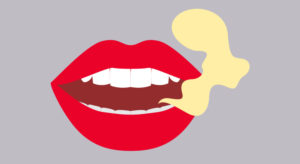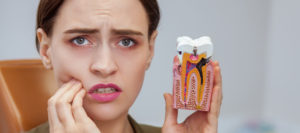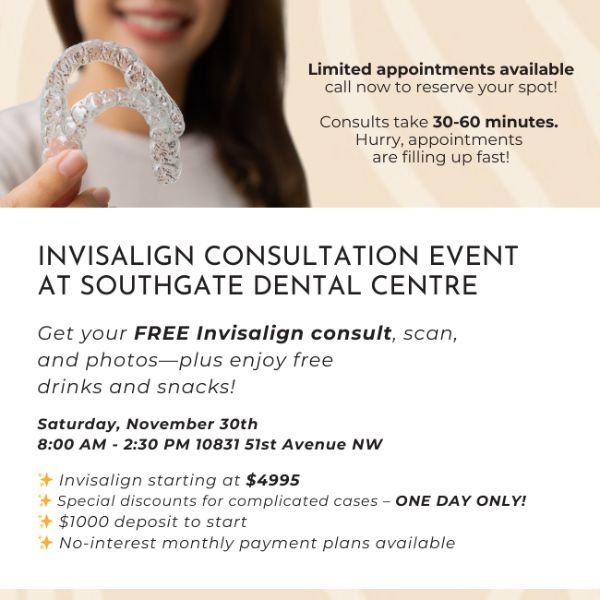Bad breath, also known as halitosis, can cause a lot of embarrassment. It is also incredibly common. According to the Canadian Dental Association as much as 25% of Canadians may have bad breath. Businesses have noticed this fact, and as a result, there are now mints, gum, mouthwashes, and other products on the market that promise to help us keep our breath fresh. Unfortunately, a lot of these measures are only temporary solutions and don’t actually address the root causes of bad breath.
Symptoms of Bad Breath

The main symptom of bad breath is an unpleasant odour that lingers on your breath. If you are unsure if you have bad breath you can either smell your breath yourself or ask a family member or close friend to help you determine if your breath has an odour.
What Causes Bad Breath?

Bad breath is caused by a lot of different things. Some causes, such as eating odorous foods, are temporary. However, according to the Canadian Dental Association, as many as 85% of bad breath cases are caused by oral cavities.
Bad breath has many causes, including:
- Poor dental hygiene. Brushing after meals and flossing at least once per day is integral to reducing and eliminating bad breath. Throughout the day a colourless, sticky film called plaque builds up on our teeth. If it isn’t brushed away it can irritate your gums (a condition called gingivitis), and eventually create plaque filled pockets between your gums and teeth. This late stage condition is called peridontitis. Your tongue can also trap odour producing bacteria, so it is important to brush or scrape your tongue as part of your daily oral hygiene routine. If you wear dentures you should also make sure they fit properly and are cleaned thoroughly and regularly to ensure they aren’t harbouring odour causing food particles or bacteria.
- Food. Food particles that remain on our teeth begin to break down, causing very unpleasant odours. Certain strong smelling foods such as garlic, onions, and spices can also cause bad breath. Even if you brush your teeth right after you finish eating the telltale scents of these foods may still linger.
- Tobacco products. Smoking causes its own set of unpleasant mouth odours. Smokers and oral tobacco users are also more likely to have gum diseases, which in turn cause bad breath.
- Dry mouth. Saliva plays an important role in oral hygiene. It cleans our mouths and helps us remove the particles that cause offensive odours. A chronic condition called xerostomia (or dry mouth) can contribute to bad breath because it reduces saliva production. Most individuals experience some degree of dry mouth while they sleep, which leads to distinctive “morning breath”, which can be potent if you sleep with your mouth open. The typical cause of chronic dry mouth is rooted in our salivary glands and may be an indicator of other diseases.
- Some medications. Some medications can affect our saliva production, causing dry mouth. Other medications release odorous chemicals when they are broken down by our bodies, which may give our breath an unpleasant odour as a result.
- Mouth infections. Surgical wounds after oral surgery (such as tooth removal) can cause bad breath. Tooth decay, mouth sores, and gum diseases can also cause bad breath as well as other problems. If you have an infection in your mouth you should see your dentist as soon as possible.
- Other mouth, nose, and throat conditions. Occasionally, bad breath can stem from small stones that form in our tonsils. These stones are covered in bacteria, which produce a strong and unpleasant odour. Infections or chronic inflammation in the nose, throat, or sinuses (which can contribute to a condition called post-nasal drip) can also cause bad breath.
Bad breath has many different causes. Some diseases such as certain types of cancer and some metabolic disorders can also cause bad breath as a result of the chemicals they produce. Conditions such as GERD (gastroesophageal reflux disease) can also give our breath an unpleasant odour.
How Can I Get Rid of Bad Breath?

Though bad breath can be caused by a variety of different things there are a number of effective ways to manage the condition both at home and at your dentist’s office.
At Home
Depending on the root cause of your bad breath you may be able to treat it effectively on your own. Home treatments can include:
- Drinking lots of water. This will ensure your mouth stays hydrated, and counteract the effects of dry mouth.
- Brushing twice per day with a fluoride toothpaste. Make sure you are flossing your teeth at least once per day and brushing your teeth at least twice per day using a fluoride toothpaste. This will ensure that all food particles, plaque, and other particulates are removed from your teeth and gums regularly. Though both brushing and flossing are important flossing has been proven to be more effective at treating bad breath symptoms.
- Flossing. Flossing is typically found to be more effective than brushing when it comes to treating bad breath caused by plaque and food particles. That is one of the many reasons it is important for you to floss your teeth at least once per day or any time food gets stuck between your teeth.
- Using antibacterial toothpaste or mouthwash. Speak to your dentist about antibacterial toothpastes and mouthwashes that can kill the bacteria that cause plaque buildup and bad breath.
- Scraping your tongue. Tongue scraping is an effective way to remove food particles and bacteria that build up on our tongues before they cause unpleasant odours.
- Avoid odours foods. Avoiding foods with strong odours such as onions and garlic can help keep your breath fresh.
- Chewing sugarless gum. After dinner mints contain sugar, which feeds the plaque and odour causing bacteria in our mouths. These bacteria produce acid, which can lead to a host of other problems including gum disease, and tooth decay. If you want to freshen your breath after a meal choose sugarless gum instead of sugary gums or candy.
- Not using tobacco. Smoking causes a wide variety of serious health problems including cancer. Tobacco use can also cause bad breath by reducing saliva production and damaging your gums.
At the Dentist’s Office
If you find that your at home solutions are eliminating your bad breath it might be a good time to make an appointment with your dentist. If your dentist discovers that your bad breath is not caused by something in your mouth you should make an appointment to see your doctor.
Bad breath can be caused by a number of factors, including cavities and gum disease. It may also be a sign of a more serious condition. If you have bad breath you should talk to your dentist and your doctor so they can help you get to the root of the problem, rule out any serious problems that might be contributing, and help you find a solution that keeps your breath fresh and your mouth happy.


